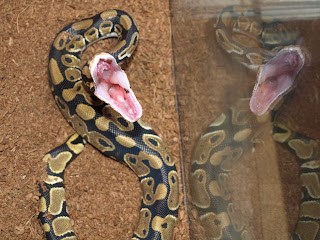 |
| the ball python bears its non-existant teeth |
All of this aside, I have realized that the snake represents more than just a ticket out of the homeschooling group. It is also a live representation of the trust that I count on between my kids and myself. Let me be perfectly clear: I have no desire to own a snake, no desire to thaw frozen baby mice on the counter top in order to feed them to the snake, no desire to regularly handle and exercise the snake, no desire to set up appropriate lights and plants for the snake's habitat. But my son does. So, after he had been asking for several years whether he could have a pet of this kind, I finally caved in. The son in question has been diagnosed with a vision problem, and he is making great strides with the help of a vision therapist in improving his ability to focus and deal with the printed word. Within a month of snake ownership, he finally started up a blog, something I had been urging him to do for years as a method of both learning to write and sharing his visual and observational talents with the rest of the of us. For in spite of being diagnosed with a vision problem, he is one of the most observant people I know, spotting owls and birds of prey on telephone poles, noticing people's shoes, and identifying undercover police cars on the highway long before I even see a car.
The python represents my faith in my son's active curiosity and innate ability to learn. He spends literal hours on-line watching dumb movies, but also hours of you-tube videos about ball pythons and how to care for them. He has been very fortunate to have found a ball python "mentor", a young man who has kept pythons for many years (actually since he was about my son's age) and who is happy to give advice and share information. So while it may appear puzzling to traditionalists that my son is only reading at a primary school level at this point, and does not know his entire multiplication table, I am secure in the knowledge that he is definitely learning how to learn. By allowing him the snake, he is driven to learn everything he can about it. In my experience, this is the essence of education.
As a teacher in a local community college, I get classrooms full of students who do not know how to learn. There are many who have learned how to get good grades, and they come to my class with nothing more than the desire to get a good grade. These students are most depressing. They pay attention, they begin the assignments doing exactly what I have showed them to do , and then they frenetically call me over to check that they are doing enough to get a good grade. I usually answer them by setting the bar a little higher than whatever they are doing. I want them to try to grasp that there might be a higher goal than the grade. There are other students who have spent so many years uninterested in whatever has been going on in every classroom that they have been in, that they approach my class almost like suicide bombers, careening through the skills with a slap dash effort and idle curiosity at the havoc they create both in their assignments and around them in the classroom. And then, there are always a few wonderful students who quietly explore the material that I am presenting, actually think about it, are curious enough to pursue other angles on it, make some connections between aspects of the material, and then pipe up in class about how they solved the given assignment in a new way. Those are the gratifying moments.
But I have digressed. I have gone a roundabout route to explain why I will not encourage my son to suffer through a boring learning experience. There is no point to it. People will actually argue that it is part of the discipline of life to be bored now and then, even that it is part of the discipline of going to school. I beg to differ. I think it encourages students to lower the bar on their own curiosity. They forget to learn how to do interesting things and think interesting thoughts. They lose track of what they are innately interested in and passionate about. How many teenagers have no idea what "they want to be when they grow up"? Might I suggest that this is because they have not been allowed to actually explore the world in a first hand way with time to follow their own passion when they were six and seven years old? They are left unsure whether they like to draw, or whether they like to think, or whether numbers are interesting.
Being bored is something that we can all do on our own. It happens. And it can even be constructive. But I see no reason to drag roomfuls of kids together to bore them. That just seems stupid. So that is indirectly why we have a Ball Python snake. Because it is extremely, compellingly interesting to my 13 year old son.

No comments:
Post a Comment